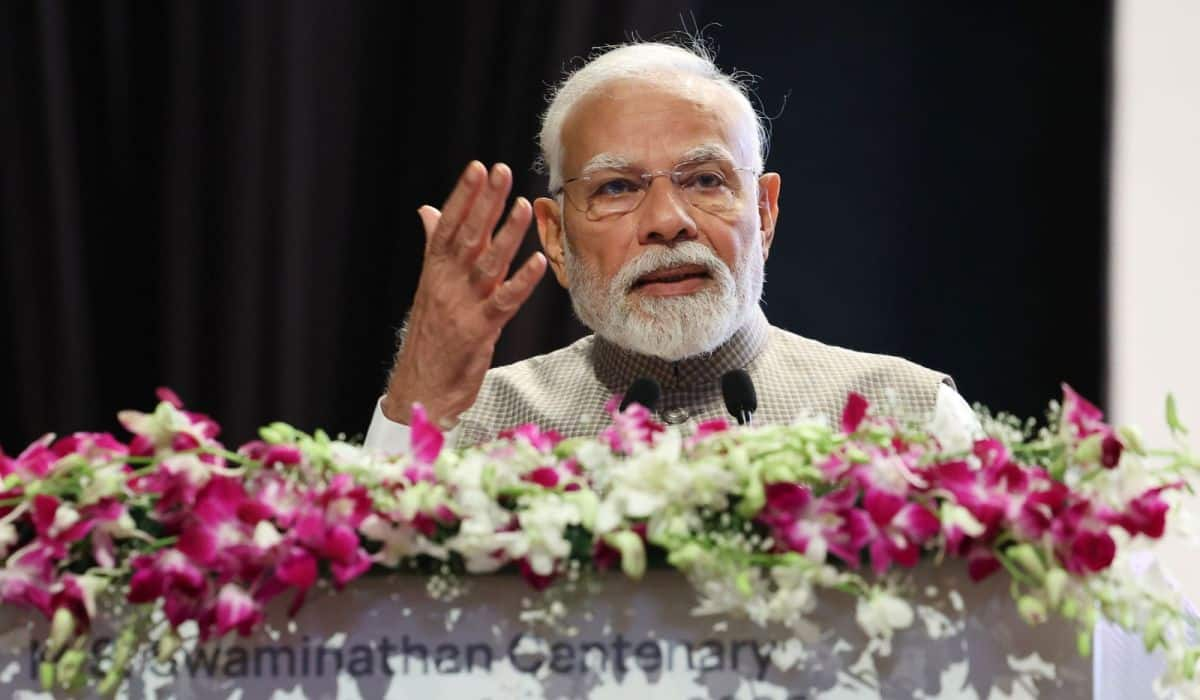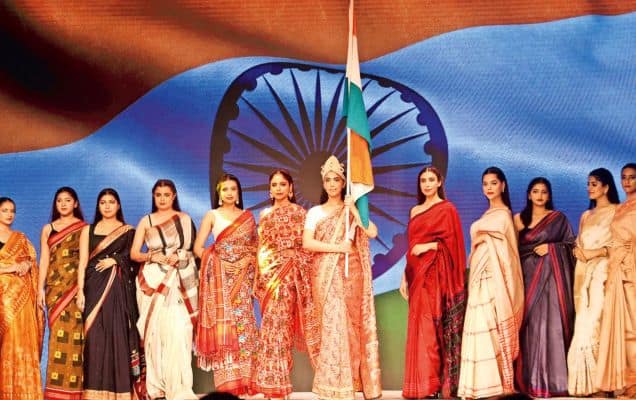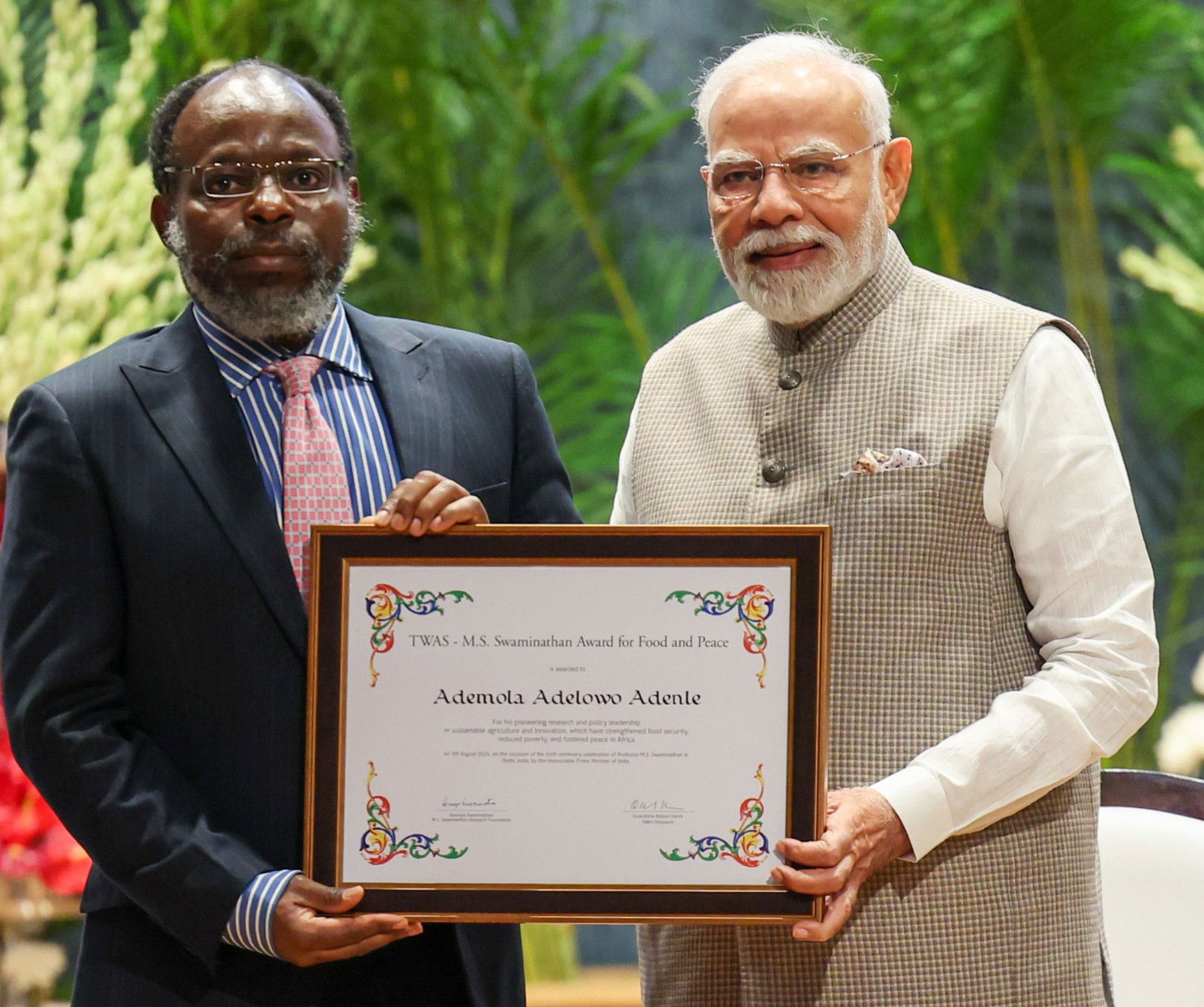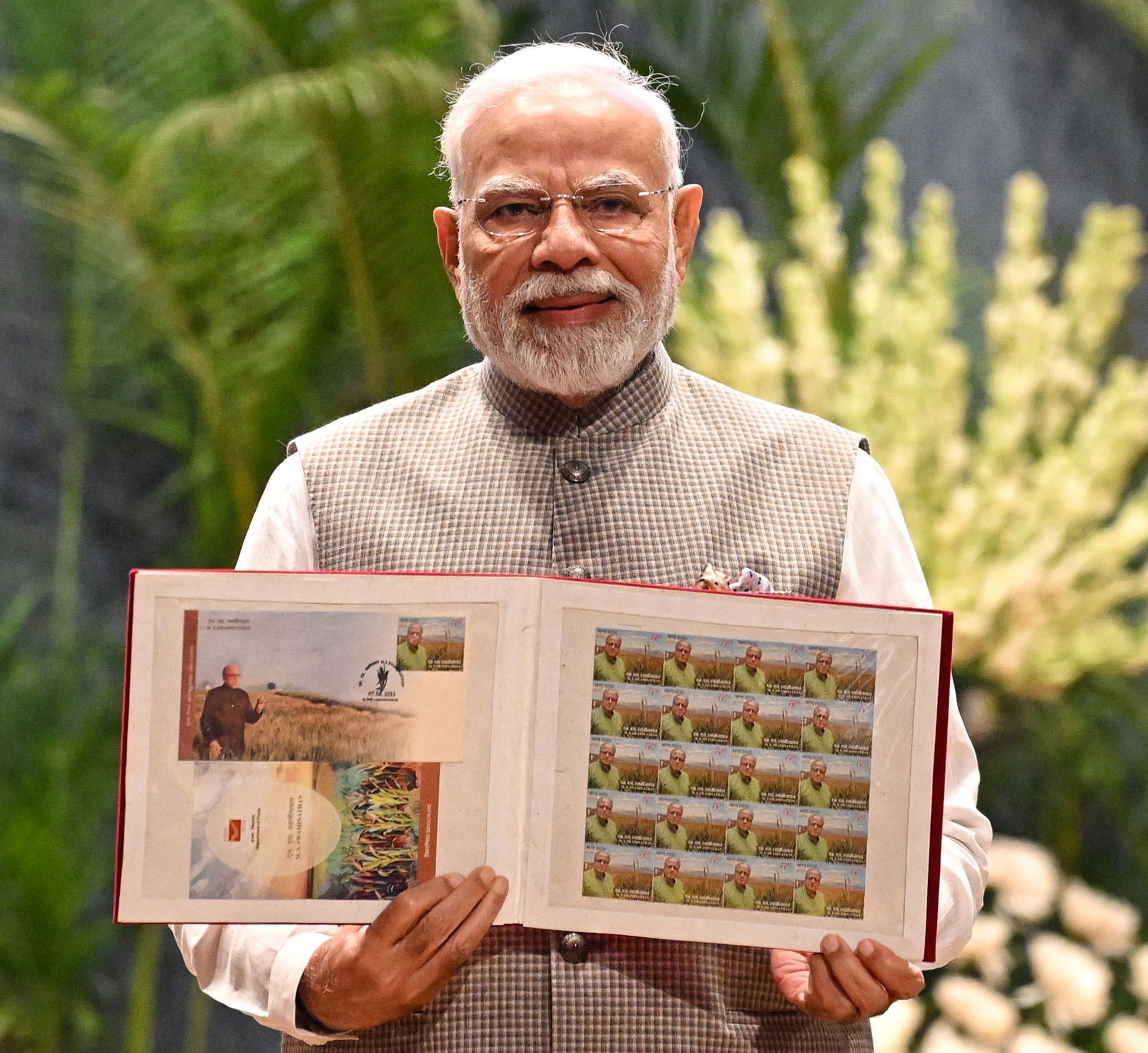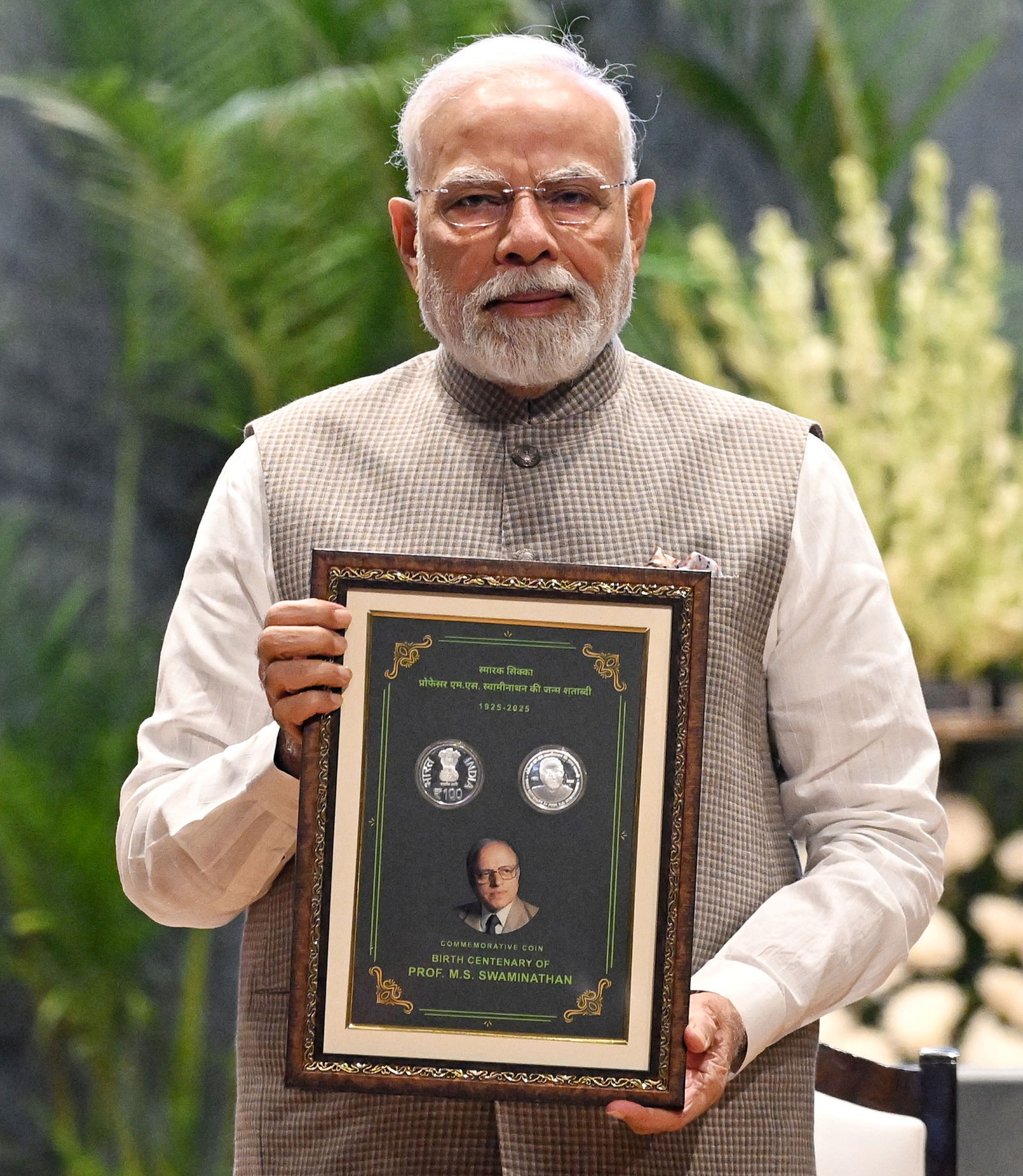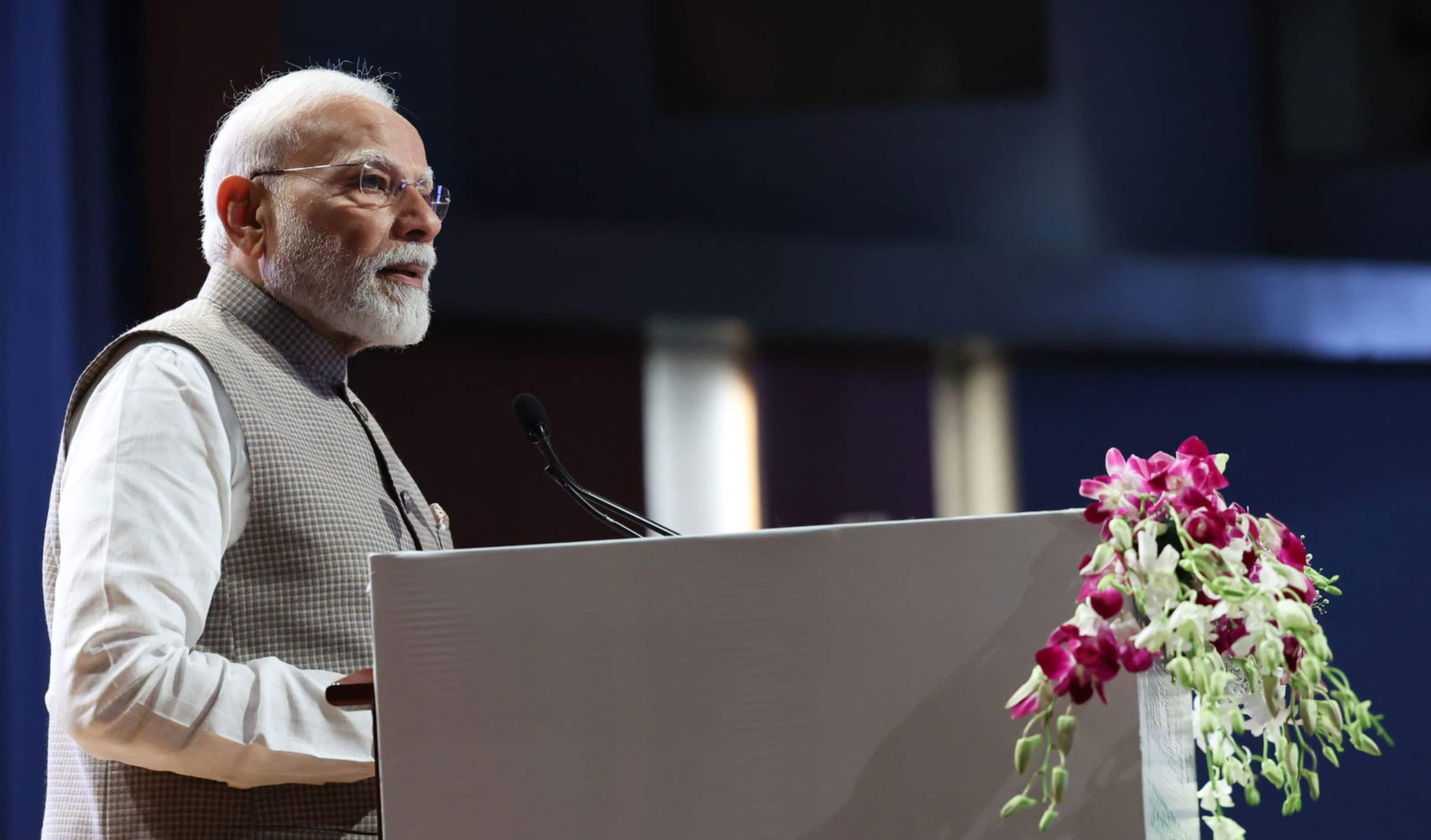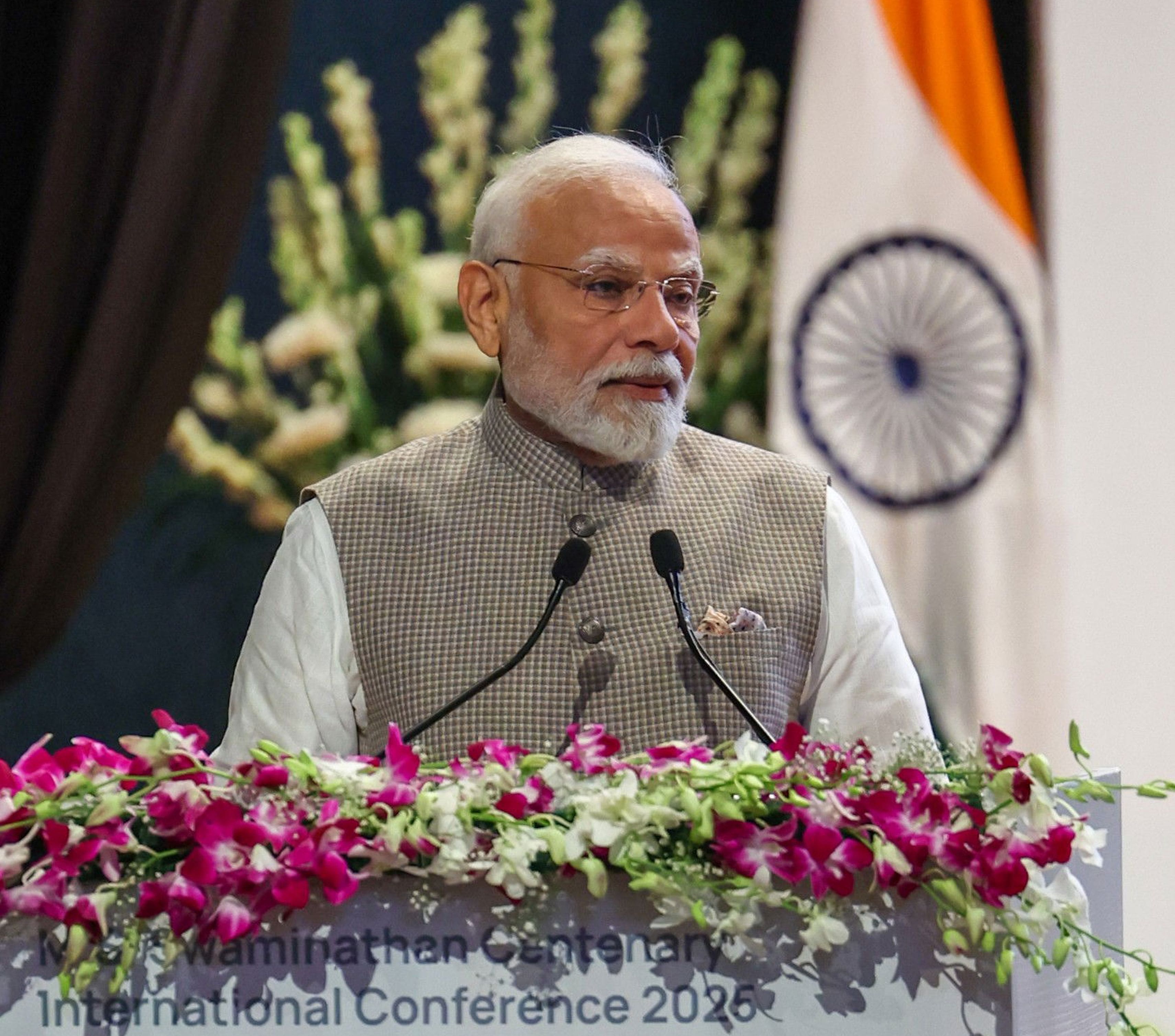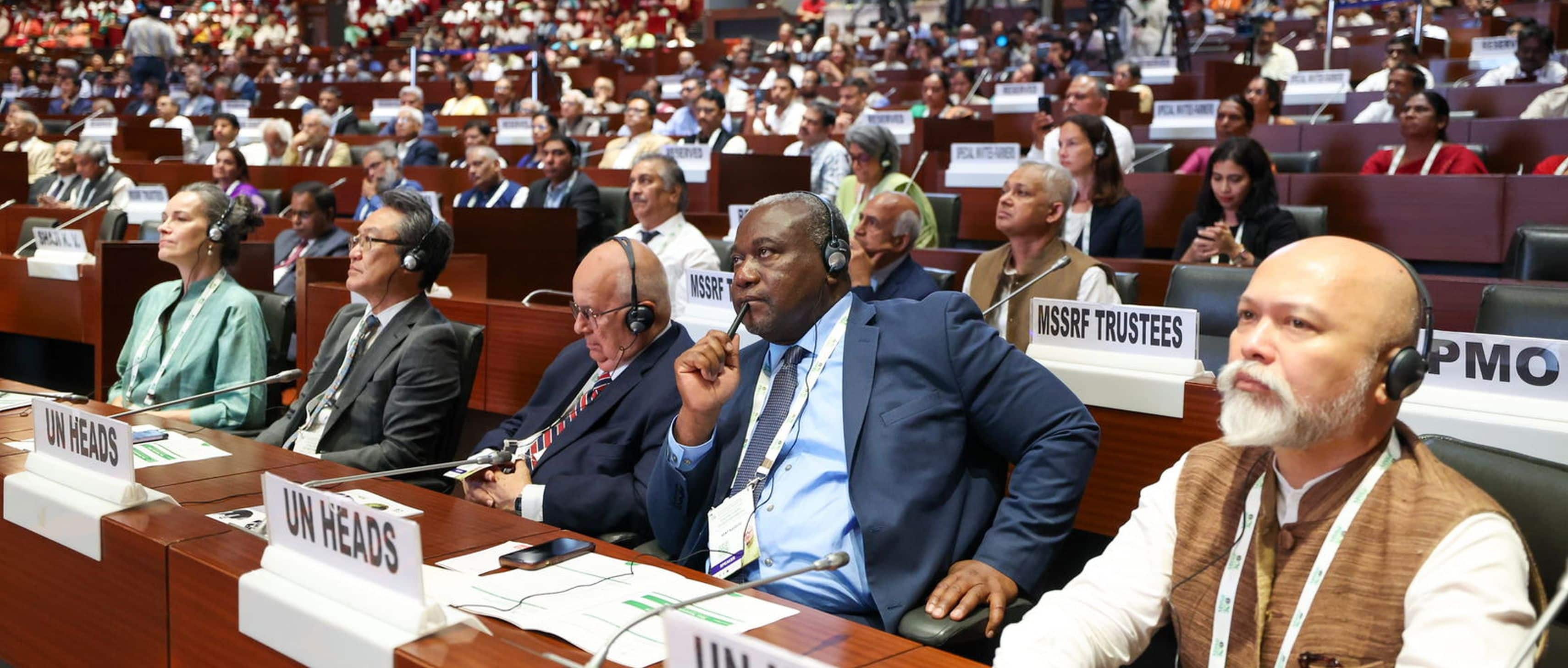Present at the event with me, Lt Governor of Jammu-Kashmir, Shri Manoj Sinha ji, Chairman Trustee, Dharmarth Trust, Dr. Karan Singh ji, all other dignitaries, ladies and gentlemen!
Today, we are releasing 11 editions that bring together 20 interpretations of the Srimad Bhagavad Gita. I respectfully salute all the scholars and others for their efforts behind this sacramental work and congratulate them. You have done a great job of making such a huge repository of knowledge accessible to today's youth and for generations to come.
I particularly congratulate Dr. Karan Singh ji, under whose guidance, this project has been realized. Whenever I meet him, a stream of knowledge and culture flows through him. Rarely do you find such people. Today is also a very auspicious occasion that it is Karan Singh ji's birthday and it is a kind of his cultural journey of 90 years. I congratulate him wholeheartedly. I wish you a long life and good health. The influence of Dr. Karan Singh ji’s work on Indian philosophy and his devotion to this holy service is vividly reflected on Indian education. Your effort has also revived the identity of Jammu-Kashmir, which has led the thought tradition of the entire India for centuries. Countless scholars, including Bhatt Bhaskar, Abhinavagupta and Anandvardhan from Kashmir, have unraveled the mysteries of the Gita to us. Today, that great tradition is once again getting ready to enrich the culture of the country. It is a matter of pride for Kashmir as well as for the entire country.
Friends,
Different interpretations of every verse of a single scripture and the expression of so many mystics symbolize the depth of the Gita on which thousands of scholars have dedicated their entire life. It is also a symbol of India's ideological freedom and tolerance, which motivates every person to have his own viewpoint. For some, the Gita is the volume of knowledge, for others it is the scripture of ‘samkhya’, it is the source of yoga for some, whereas it is the lessons of karma for others. Now, when I look at the Gita, it is like a transcendental form that we find in the 11th chapter मम देहे गुडाकेश यच्च अन्यत् द्रष्टुम इच्छसि। i.e., you can see whatever you want to see in me. You can view every idea and energy.
Friends,
The cosmic form of the Gita has guided our nation in every period, from the Mahabharata to the struggle of independence. You see, Adi Shankaracharya, who united India, saw the Gita as a spiritual consciousness. Saints like Ramanujacharya interpreted the Gita as an expression of spiritual knowledge. For Swami Vivekananda ji, Gita has been a source of unwavering diligence and indomitable confidence. For Sri Aurobindo, the Gita was a true embodiment of knowledge and humanity. The Gita was a beacon in Mahatma Gandhi's most difficult times. The Gita has been the inspiration of Netaji Subhas Chandra Bose's patriotism and valour. It is the Gita, which was interpreted by Bal Gangadhar Tilak and gave new strength and energy to the freedom struggle. I think the list can be so long that even several hours will fall short. Now, when the country is going to celebrate 75 years of independence, we should all try to put this aspect of the Gita before the country also. We should also research, write and familiarize our younger generation with how the Gita gave energy to our freedom struggle, how our freedom fighters dared to sacrifice for the country and how the Gita united the country spiritually.
Friends,
The Gita is the text of India's solidarity and the spirit of harmony, because the Gita says, ‘समम् सर्वेषु भूतेषु तिष्ठन्तम् परमेश्वरम्’ i.e., the Lord dwells in the hearts of all beings. The man is God. The Gita symbolizes the nature of our knowledge and research, because the Gita says ‘न हि ज्ञानेन सदृशम् पवित्रम् इह विद्यते’ i.e., nothing is holier than knowledge. The Gita is also the source of energy of the scientific temperament of India, because it is written in the Gita ‘ज्ञानम् विज्ञानम् सहितम् यत् ज्ञात्वा मोक्ष्यसे अशुभात्’ i.e., when there is confluence of knowledge and science, all problems are solved. The Gita symbolizes India's devotion to Karma for centuries, because the Gita says ‘योगः कर्मसु कौशलम्’ i.e., devotion is doing duties efficiently.
Friends,
The Gita is a spiritual scripture that dared to say ‘न अनवाप्तम् अवाप्तव्यम् वर्त एव च कर्मणि’ i.e., God, who is free from all the losses and profits and desires, also can’t survive without Karma. The Gita says in all practicality that no one can live without performing karma. We cannot be free from Karma. Now it is our responsibility to decide what direction we give to our deeds. The Gita shows us the way and does not impose any order on us. The Gita did not impose any order on Arjuna, and now Dr (Karan Singh) Saheb was also saying the Gita does not preach. After preaching the entire Gita, Shri Krishna said to Arjun in the last chapter ‘यथा इच्छसि तथा कुरु’ i.e., I said as much as I had to say; now you do what is right according to you. Nobody can be a liberal thinker like him. This freedom of karma and thought has been the true hallmark of India's democracy. Our democracy gives us freedom of our thoughts, freedom of work, equal rights in every sphere of our life. We get this freedom from the democratic institutions that are the custodians of our Constitution. So, whenever we talk of our rights, we must also remember our democratic duties. Today, there are some people who are busy thinking how to hurt the dignity of constitutional institutions and their credibility! There are attempts to attack our parliament, judiciary and even the army in the political interests. This tendency causes a lot of damage to the country. It is a matter of satisfaction that such people do not represent the mainstream of the country. Today the country is moving ahead by considering its duties as resolutions. The country is today trying to change the lives of the village, the poor, the farmers, the workers, the Dalits, the backward and the service of every deprived person of the society by making “Karma Yoga” (selfless action) of the Gita as its mantra.
Friends,
Through the Gita, India has served the entire humanity outside the boundaries of the space and time. The Gita is a treatise that is for the whole world, every creature. It has been translated into so many languages of the world, so many countries are doing research on it and so many scholars of the world are associated with it. It is the Gita that introduced the world to the ideals of India like selfless service. Otherwise, India's selfless service, our spirit of 'universal brotherhood ', is nothing short of a surprise to many.
You see, when the corona-like pandemic struck, the entire world was unaware of this menace; it was an unknown enemy. The world was not ready, human beings were not ready and the same situation was for India also. But India also managed itself, and did not lag behind in what it could do to serve the world. The countries around the world were provided medicines and all necessary materials. Today, there are many countries in the world which did not have the resources for vaccines. India delivered the vaccines to them without any condition. This service is nothing short of a pleasant surprise for the people there. It is a different experience for them.
Friends,
Similarly, India also evacuated those from other countries who were stranded in different parts of the world and sent them safely to their countries. India did not count its profits or losses. India considered the service of human beings as karma and performed this duty. When the people and leaders of the world call it India’s support and thank me, I say for India, this is not help but the values of India. India does not view it as greatness, but humanity. The world understands essence of India’s selfless spirit of serving human beings for centuries when it peruses the Gita. This is what the Gita has taught us ‘कर्मणि एव अधिकारः ते मा फलेषु कदाचन’ i.e., one should work with the self-less spirit without worrying about results. The Gita has told us: ‘युक्तः कर्म फलं त्यक्त्वा शान्तिम् आप्नोति नैष्ठिकीम्’ i.e., one finds inner peace by doing work with the spirit of duty and service without concerning himself about the fruit of the action, like gain and loss. This is the greatest happiness, the greatest award.
Friends,
Lord Krishna has described three tendencies – Tamasic (dark), Rajasic (passionate) and Sattvic (pure) – in the Gita. All the observant people who are associated with the Gita are here before me. All of you know that there are so many shlokas (verses) regarding this in the 17th chapter of the Gita. According to my experience, if we have to describe these Tamasic, Rajasic and Sattvic tendencies in a simple way then the Tamasic tendency is that I should have everything that belongs to others. This causes wars, unrest and conspiracies in the world. What is mine should remain with me and what belongs to others should remain with them is Rajasic tendency, a normal worldly thinking. But what I have is as much as everyone, everything I have is for humankind, it is a Sattvic tendency. India has always shaped its human values, created the criteria of society as per this Sattvic tendency.
The first thing that we teach children in our families is that whatever you receive, share with everybody and keep the rest. We don’t believe in I, me, mine, but togetherness. It is because of these values that India never based its wealth, knowledge and inventions on economic grounds. Whether it is knowledge of mathematics, textile, metallurgy, different types of business experiences, or the science of Ayurveda, we considered them to be the assets of humanity. The science of Ayurveda has been serving humanity for ages when modern medical science was not in this form. Even today, when the world is once again talking about herbal and natural, is focusing more on healing ahead of treatment, when Ayurveda is being researched in different countries, India is encouraging it and also helping. In the past also, foreign students came to our ancient universities, foreign travellers came; we shared our knowledge and science with everyone with all generosity. The more progress we made, the more efforts we have been making for the progress of human being.
Friends,
Our values and our past are emerging once again as a resolution for Atmanirbhar Bharat. Once again, India is strengthening its potential so that it can give impetus to the progress of the entire world and serve humanity more. The contribution of India, which has been seen by the world in recent months, will contribute to the Atmanirbhar Bharat and will be of great help to the world in a more comprehensive manner. The country needs the selfless people as described in the Gita to accomplish this goal. In order to ensure a new dawn of a new India from the darkness of centuries and for Atmanirbhar Bharat, we need to recognize our duties and commit to them.
Just as Lord Krishna said to Arjun: ‘क्षुद्रम् हृदय दौर्बल्यम् त्यक्तवा उत्तिष्ठ परंतप’ i.e., stand up now leaving behind small thinking, small mind and internal weakness. While preaching this, Lord Krishna addressed Arjun as 'Bharat' in the Gita. Today, this remark of the Gita is for our India, for the 130 crore Indians. Today, there is a new awakening towards this call. Today, the world is looking at India from a new perspective and with respect. We have to take this change to the pinnacle of India's modern identity and science. I am confident that together we will achieve these goals. The 75 years of independence will become the basis for the beginning of a new future for the country.
I once again congratulate Dr. Saheb, all the dignitaries who run this trust and for the hard work that you have put in behind this work. I am confident that this book will be of immense help to people who are used to such books for reference material. I think you have given a precious treasure. I fully agree that this is perhaps the first book in the world which was created in the battlefield amidst the battle cry. It was preached when the victory or the defeat was knocking on the doors. It can be nothing but nectar that such a serene ideology emerged from such an adverse and disturbed environment. It is the duty of every generation to impart the knowledge of the Gita to the future generations in the language and the form they understand. Dr. Karan Singh ji, his entire family, their great tradition has always kept this pursuit alive. I am hopeful that the next generations will also keep it alive. We will always remember the services of Doctor Karan Singh ji. I respectfully salute him for this great work. He is so senior in age, so senior in public life that his blessings remain with us so that we also continue to do something with these ideals for the country.
Many thanks!











